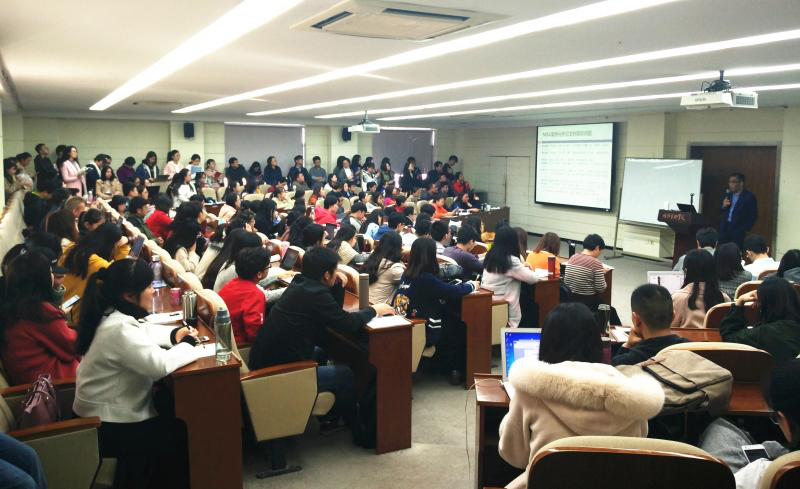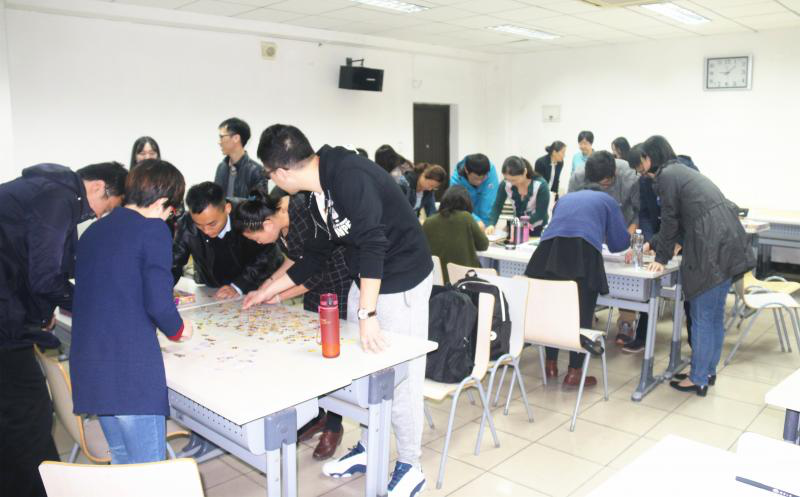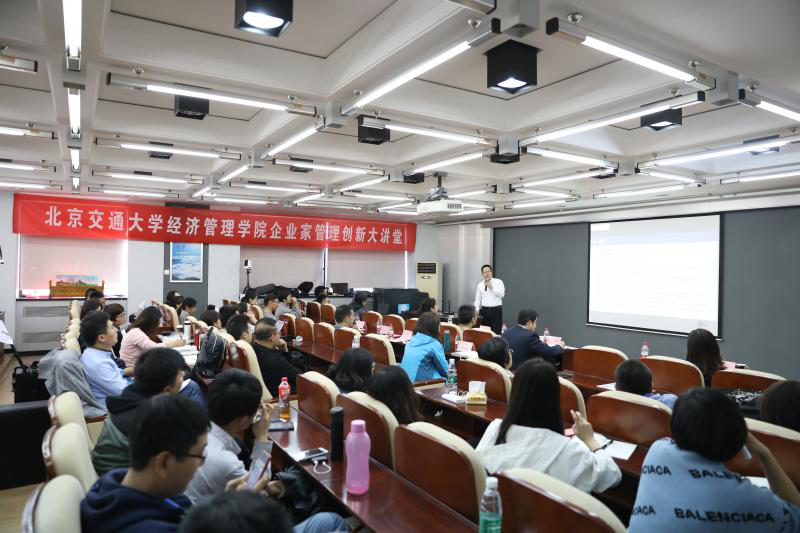Recently the long and in-depth report Cases Should Become the Source of the Development of Business Schools: The Case Work of School of Economics and Management of Beijing Jiaotong University Has Remarkable Results, written by the Brand and Marketing Office of School of Economics and Management (SEM), was successively published by China Daily, China Youth, China MBA Education and so on. It was also published by Beijing Jiaotong University (BJTU) on the home page of its website by rolling the news column. The full text is as follows.
Cases Should Become the Source of the Development of Business Schools:
The Case Work of School of Economics and Management of Beijing Jiaotong University Has Remarkable Results
In September 2018, the results of the 9th National Top 100 Management Cases hosted by the China National MBA Education Supervisory Committee and China Management Case Sharing Center were released.
Among the 92 cases from 45 colleges and universities, 7 are from the School of Economics and Management (SEM) of Beijing Jiaotong University (BJTU), which makes SEM one of the three most awarded schools in this competition. In the 6th National Management Case Talents Competition held in the same month, the team of MBA students for SEM won the third place among 1500 teams of 88 colleges and universities in the country. Cases have become the brand work for the development of the service industry of the school and the cultivation of leading talents, which has attracted attention from the society.

Invite Experts to Conduct Training on Case Writing
Retell the Story of the Enterprise for the Students
The concept of financial sharing is commonly discussed in accounting related courses offered for MBA programs in domestic universities. In order to make students truly understand this abstract concept which has less than a hundred words when explaining, Professor Cui Yongmei of the Accounting Department of SEM systematically combed the rich materials accumulated through years of cooperation with China Railway and wrote a teaching case entitled Small Pivot, Big Future: How to Break Through Financial Sharing. Later, it was selected as 100 Excellent Management Cases" by the National MBA Education Supervisory Committee.
As a practitioner of case teaching and vice dean of SEM in charge of case work, Cui Yongmei introduced that case teaching is one of the best teaching methods in business education at present. Through representation of the wonderful stories of enterprises, students will be allowed to enter the situation of decision-making. While fully understanding and mastering the knowledge, they can also quickly improve their ability to analyze and solve practical problems.
Professor Gu Yuanxun from the Department of Enterprise Management of SEM has the similar thoughts. In 2006, Gu Yuanxun, who had been working in the company before, came to SEM. As a new teacher, he found it difficult for students to understand the concept of enterprise organization when teaching human resource management to undergraduates, so he tried to illustrate with two examples of enterprises he was familiar with, and achieved unexpected good results. Although this was not a case teaching technically, this success had confirmed his choice of case teaching. He said, For me, I can make good use of the experience of working in the enterprise. For students, it is a completely different experience to transform the study of abstract concepts into the study of actual scenes through the reappearance of management situations. Over the years, Gu has always been committed to case study and teaching and has achieved fruitful results. His three cases were collected by the Case Library of China Management Case Sharing Center, and two were rated as National Top 100 Cases. His case-based course has become one of the most popular classes for students, covering all levels of undergraduate, master and doctor.
In 2014, SEM of BJTU formally established the Case Center to promote the development of management case teaching and case study, and promote the development and sharing of local cases in China. Since its establishment, the Centers work has always been teaching-oriented, and it has also made efforts in the construction of faculty team and case database.
On the one hand, SEM has made great efforts to support faculty to participate in the high-level case courses at home and abroad, such as Harvard Business School and Babson Business School, and to learn the first-class mode of case teaching. More than 210 teachers have participated in four years. At the same time, regular case salons have been held for exchanges and discussions among business executives, university experts and scholars. Up to now, more than 50 salons have been held. Through various projects of sending out and inviting in, SEM has formed a case teaching team of nearly 100 teachers in different departments. Among them, Gou Juanqiong, Gu Yuanxun, Liu Dehong, Ke Jinchuan, Cui Yongmei, Zhou Shaoni, Xiao Xiang, Ma Zhong, Zhao Yang, Li Yuanhui, Zeng Delin, Xing Ying, Zhao Jianmei, Zhou Huiyu, Zhang Lili, He Lin, Xie Jigang and Zhao Xiaoli have won many national case development awards.
On the other hand, SEM invests hundreds of thousands of yuan each year to set up funding projects, which encourage teachers to declare case projects. After the case is proved, it will enter the teaching case library of SEM. In order to improve the facultys enthusiasm, SEM has included the case work in the employment evaluation and reward system of symbolic achievements, and at the same time, case work has also become a necessary link for their professional title promotion and social practice achievement acceptance, which is rare in domestic colleges and universities. In recent years, more than 130 original cases have been developed by faculty of SEM, of which nearly 50 have been included in major case libraries in China, and more than 20 have been rated as excellent cases by national teaching committees such as MBA, MPAcc, MV, MF, etc. Moreover, SEM also purchased top case libraries such as Harvard and Yiwei as important materials for faculty to carry out case studies and teaching.
This kind of systematic and high-standard cultivation is remarkable for the improvement of faculty. Associate Professor Zhang Lili from the Department of Finance, director of SEMs Case Center, has benefited a lot. She admitted that she had little idea of case teaching before she served as the director of the Case Center. After applying case teaching in her work, as she said, it was like discovering a new world, which was really different. In the era of knowledge explosion and informationization, the knowledge in textbooks often lags behind, and information technology has greatly expanded the channels for students to learn by themselves. The traditional way of class is more and more difficult to meet the needs of students, and their experience of class is very poor. Through case teaching, students are involved in the process of corporate management and decision-making, and they become more active in the class. In particular, the training of students of professional degree emphasizes the ability to practice and solve problems. Case teaching can best meet their learning expectations. In just a few years, Zhang Lili quickly grew from a case manager to a young backbone of SEMs case studies and teaching by attending Harvard Business School case training, organizing and participating in the Case Salon.
While vigorously promoting case teaching, SEM also pays attention to guiding students to participate in case study so as to enhance management practice and the ability of analysis and expression. For example, MBA students are encouraged to write graduation theses with case studies as the main body, and the proportion has now reached more than 80 %. Every year, more than 600 students take part in the school-enterprise interaction case competition. SEM also instructs students to participate in the National Management Case Competition, and they have won 12 awards.

Hold Courses for Students to Carry out Case Practice
Discover Theory from the Development of the Industry
Beijing Jiaotong University was born because of the development of railway and started with the study of management. Its predecessor was the Railway Management Institute founded by the Qing government in 1909, and it was the first institution of higher learning in China to train management talents. The discipline of economics and management in Beijing Jiaotong University started at the establishment of the university and is the oldest discipline. In the past 100 years, under the guidance of the school motto of to know and to do, SEM has formed its business culture of holding up the heavens, and supporting the earth. Holding up the heavens means a high-level theoretical study, and supporting the earth means the connection with the industry. Case study has become an effective carrier for this culture in the new era.
In the past 40 years of reform and opening up, Chinas economy and industry have undergone unprecedented changes, which not only provides a fertile soil for the innovation of business theory, but also puts forward urgent requirements. Cui Yongmei said, It can be said that the practice of Chinas economy is far ahead of the theory, and the existing economic management theories in both China and the West cannot fully explain the current economic situation in China. This requires us to sum up experience, discover theory, and create new knowledge from practice. Case study is an important tool. It is undoubtedly of great significance to sum up and create a new theory of Chinas economic development through an in-depth analysis of the symbolic enterprises and the present-day model.
As the birthplace of Chinese modern management discipline, the School of Economics and Management of Beijing Jiaotong University has always had close contact and interaction with industry. Relying on the existing four first-class disciplines of applied economics, business management, management science and engineering, and public administration, as well as eight national and provincial-level platforms, SEM has always aimed at national strategies and industrial development needs, actively served the development of national transportation, modern logistics, capital and finance, information and technology, construction and real estate, tourism and health, and has become an important force supporting and leading Chinas industrial development. The faculty of SEM undertake more than 200 industrial research and service projects every year, and SEM also employs more than 300 entrepreneurs and experts with profound theoretical knowledge and rich practical experience as part-time professors to participate in research and teaching, bringing a steady stream of cases to the school. Most of the 130 original cases developed by the faculty in recent years are direct transformations of related research results.
Give full play to the advantage of cross-disciplinary integration in SEM, Professor Gou Juanjiongs team in the Department of Information Management of SEM has also established long-term and close cooperation with China Railway Group, covering topics such as research, project design, decision-making consultation, etc. But this is far from our goals, said Gou Juanqiong. For colleges and universities, the most important and difficult thing is how to integrate the real problems of enterprises with their own scientific research and teaching. She believes that case study provides the key to this problem. There are many ways for universities to cooperate with enterprises, such as helping them solve some specific problems through project approval. But at the same time they can also be separated. Instead of specific cooperation, the university can act as a independent case researcher to objectively and calmly observe and analyze the enterprise. For some important issues that are not urgent, that is, issues that enterprises are not eager to solve at present, but will be of great concern in future development, the university can put forward solutions and good suggestions. In this way, we can find the boundary and balance point of cooperation between universities and enterprises, do a good job in enterprise services, and truly play the role of innovation and leadership of universities. In fact, in the process of China Railway Group taking the lead in promoting the construction of management accounting platform in China, her team played the role of external consultant and gave some constructive suggestions.
Based on the above ideas, SEM will also explore a new model called case sandbox in the next step. The traditional case study is that we summarize it when someone else has finished the case. As Gou Juanjong said, case sandbox means that teachers and students take the initiative to search for valuable issues in the practice of the enterprise and carry out further research on this basis. This method can provide references for enterprises practice and therefore is highly forward-looking and innovative. She stressed that since the case sandbox can be implemented by both the facultys research team and the whole class, it has opened a new model that truly integrates teaching, research and social services.
While focusing on the case study, Gu Yuanxun also found that the key to ensuring the quality of the case is to always maintain the sensitivity to the development of the enterprise, continuously update the knowledge and information and thinking methods, and pay close attention to the typical business model and innovation mechanism. In his lecture Business Model Innovation, an MBA student deeply regrets that he did not hear Gus course earlier after studying the course and discussing the case. He said that for the problems he had encountered in the failure of the enterprises, he had found the answers in the classroom.

Co-organize the Entrepreneur Management Innovation Lecture with the China Enterprise Confederation
Create a Sharing Mode of Business Intelligence
As an important part of the value system of the School of Economics and Management of Beijing Jiaotong University, SEM has taken the mission of contributing to the wisdom of business studies, cultivating leading talents and benefiting the economy and society. The case work clearly carries the above three missions, and it has the distinctive features of contributing to the wisdom of business studies and realizing multi-party sharing.
In Cui Yongmeis view, the creation of business wisdom means that school and enterprises carry out cooperation, joint case development and joint discovery of new knowledge; the spread of business intelligence means that through case teaching, the story of the company is repeated to the students, who are future entrepreneurs and managers; the sharing of business wisdom means to exchange experiences and enlighten ideas through case salons. She emphasized that under the background of sharing economy, how to promote multi-party sharing and knowledge creation of cases, especially original cases for research and development of Chinese enterprises, is a meaningful topic.
Zhang Lili also believes that cooperation with enterprises in developing cases can not only ensure high-quality case teaching and talents training in the school, but also provide decision-making basis for enterprises and serve their own development. The exchange of information between schools and enterprises and the deep combination of scientific research and teaching will create a win-win situation. While continuously exploring case teaching models that are in line with the characteristics of business schools, we should enhance the connection between enterprises and schools, theory and practice.
In 2016, in order to promote the practice and theoretical research of Chinese enterprise management, School of Economics and Management of Beijing Jiaotong University signed a cooperation agreement with China Enterprise Confederation, which includes the joint construction of China Enterprise Alliance Beijing Jiaotong University Enterprise Management Case Database, the construction of enterprise management case base, cooperative development of enterprise management cases, and so on. This has also become a landmark achievement for the school to cooperate with enterprises to carry out case studies and deepen theoretical innovation and sharing. Over the past two years, first-hand information of more than 2,000 enterprises which are leading in Chinas management and innovation industry, has been provided to SEMs faculty as basic materials for case studies and teaching. A number of enterprise case bases have been established and school-enterprise cooperation has been deepened. Since 2018, the two sides jointly held the Entrepreneur Management Innovation Lecture and invited a leading entrepreneur from the industry to give lectures at the school every week to share the achievements and experiences of enterprise management and innovation. It has become a high-end platform for production, research and practice collaborative innovation between enterprises and universities. Every lecture enjoys lots of listeners including teachers, students, alumni and corporate.
In fact, as an important part of open education, School of Economics and Management of Beijing Jiaotong University has also made great efforts in internationalizing its case work. One of the most influential measures is the establishment of a cooperative relationship with Professor Pan Shanlin of the University of New South Wales in Australia, who is the top expert in international case studies, relying on the national intelligence introduction program. In addition, SEM has also deepened all-round exchanges such as faculty training, teaching model reform, case development, and case paper writing, so as to enhance the connection between the school and the world and achieve overall improvement.
SEMs vision is to become a business school leading Chinas industrial development. This is not an empty talk, but has a solid foundation and firm action. Cui Yongmei said, Our case study and case teaching not only directly serve the development of national industries, but also devote to training leading talents and industry elites, thus truly realizing the innovative leadership. Cases have become the source of the development of SEM, and we will continue to promote them. (Written by Li Shizhen)









